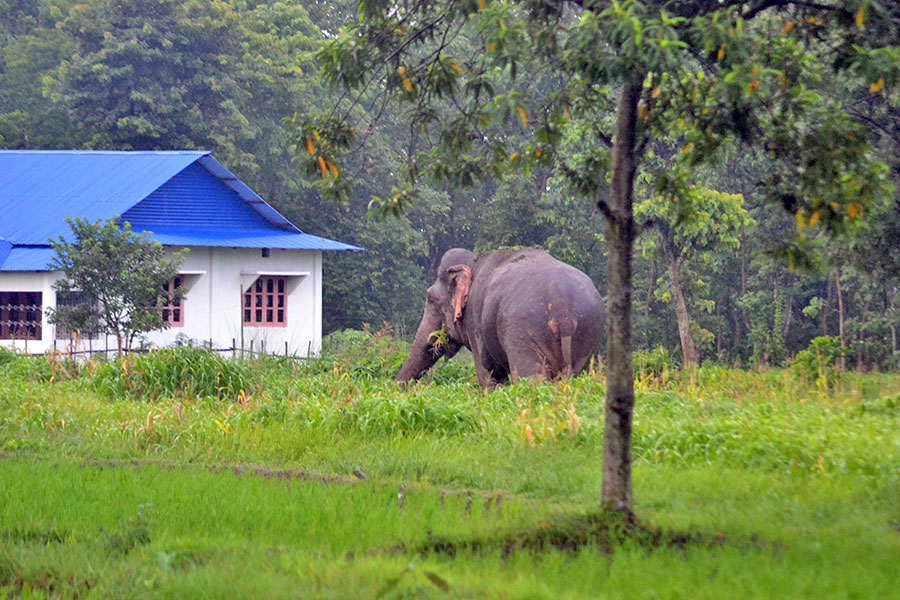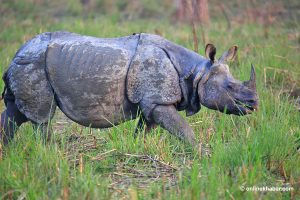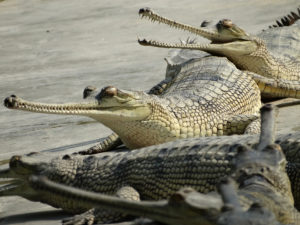
Perhaps the publication of a media report on the global conservation NGO WWF’s alleged involvement in providing assistance and rewards to nature park officials involved in human rights violation across the world and the release of a Nepali movie based on the memoir of a Nepali park ranger within the same week is only a coincidence. But the two events are not only related to one another, but also raise similar issues plaguing the conservation ‘industry’ in Nepal and around the world.
The BuzzFeed report, prepared in collaboration with The Kathmandu Post, begins with the death of Shikharam Chaudhary, a native of Chitwan district of Nepal, in June 2006. The case is then highlighted to talk about stories of human rights abuses in Nepal and India among six countries. The Manoj Pandit-directed Khaag, based on the memoirs of former Chitwan National Park warden Kamal Jung Kunwar, also deals with Chaudhary’s death. The movie, however, cleverly introduces itself as a ‘work of fiction’, perhaps in its bid to avoid controversy.
Between the publication of the report and the premiere of the movie, Onlinekhabar interviewed Kunwar, whom BuzzFeed has claimed to be one one of the people behind Chaudhary’s ‘murder’. The report, the movie and the interview with Kunwar brought up some interesting aspects of the whole episode.
1.
What do Buzzfeed, Khaag, Kunwar say about Shikharam’s death?

On the death of Chaudhary, whom Kunwar was quick to label as a ‘poacher’, BuzzFeed writes, “An autopsy showed seven broken ribs and “blue marks and bruises” all over his body. Seven eyewitnesses corroborated his wife’s account of nonstop beatings.” The claim in the report is also corroborated by statements from other multiple sources.
Kunwar, however, in the interview claims that it was not possible that Shikharam died of torture as the doctors told him there were no signs of internal bleeding. “If is ribs had been broken, it should have caused internal bleeding,” he says.
In the movie, a doctor tells Kunwar that Shikharam died of a brain hemorrhage, and park officials need not worry about ‘possible complications’. Kunwar claims that he was in India when the Tharu man died in hospital. In the film, however, Kunwar learns about the death from a staffer who visits him at night.
BuzzFeed writes, “Fellow detainees reported that they had seen the guards kicking him in the chest, beating him with bamboo poles, and stomping on him with their boots.” But Kunwar says, “It is only natural that when someone dies in custody, people associate it with torture.”
2.
What do Buzzfeed, Khaag, Kunwar say about torture?

The BuzzFeed report says that park officials used torture as a means of obtaining information from poaching suspects. Kunwar tells BuzzFeed that waterboarding, beating and whipping were just part of the interrogation.
The movie also concedes that torture was indeed used by rangers to obtain information. The first sequence of the movie shows Kunwar and his staffers visiting a suspect’s neighbourhood and raiding random houses without confirming whom the houses belonged to.
As shown in the movie, the relationship between park officials and the neighbourhood is hostile. The officials do not fulfill the standard procedures while conducting raids whereas local community members are outraged and irritated over their presence. The officials are not polite, even in the movie, when they need to apologise to the local community.
The movie does not show the audience the park’s detention centre which the BuzzFeed report describes as the ‘jail’, where most severe forms of torture, including waterboarding, would be meted out on suspects to force them to confess. However, the film includes several sequences in which Kunwar slaps detainees to obtain confessions from them. It also shows suspected poachers ambushing Kunwar and the ranger threatening locals that he’d send them behind bars for 15 to 20 years if they do not cooperate with him.
3.
On rewarding informants?
The BuzzFeed report claims, “Forest rangers often pay people in villages to act as informants. That tactic is risky even when it’s used by trained law enforcement and intelligence agencies since an informant can be tortured or killed if their cover is blown.”
The movie confirms the claim. Kunwar regularly pays a character named Buddhi to work for him. The official verbally abuses the informant whenever he fails to deliver.
This scene raises questions on the source of money that the officials pay informants with. The BuzzFeed report says global charities like WWF fund such illegal and immoral activities. It cites a global training manual of WWF drafted in 2015, which encourages officials to use a range of motivations to obtain information, “Fear; Revenge; Money; Repentance; Altruism.”
4.
What about the issue of militarisation of conservation?
The militarisation of conservation is a growing concern across the world and the BuzzFeed report also raises questions on the practice. It writes, “Chitwan’s forest rangers work alongside over 1,000 soldiers from the park’s army battalion. Nepali law gives them special power to investigate wildlife-related crimes, make arrests without a warrant and retain immunity in cases where an officer has “no alternative” but to shoot the offender, even if the suspect dies.”

Kunwar, in the interview, suggests conservation practices in Nepal are less militarised than other countries. He claims that removing the army from protected sites will result in a sharp increment in poaching of wildlife.
“I agree that the community has a major role in conservation efforts. But if we hand over the responsibility to the locals in this situation, they will finish all the rhinos as they did with the trees of Terai forests,” he says adding the idea of community forest dramatically failed in the southern plains of Nepal because the locals were irresponsible.
The movie does not show army personnel doing their job. However, the scene of nighttime raid reminds people of the army rule.
5.
Locals’ participation in conservation?
Kunwar claims that locals have been an inevitable part of the conservation efforts in Nepal. “The concept of the buffer zone was developed with the belief that conservation practices cannot be sustainable without the participation of locals. There is a policy that dictates that 30 to 50 per cent of the national park’s income should be spent on the buffer zones. Nepal’s ‘zero poaching’ campaign has been successful because the community worked as a wall against the poachers.”
However, the BuzzFeed report claims the park deprives locals of their fundamental rights. “To clear the way, tens of thousands of indigenous people were evicted from their homes and moved to areas outside the park’s boundaries… One man told BuzzFeed News that Chitwan soldiers had beaten him so badly the year before that they had broken his eardrum. Others said their fishing permits were abruptly denied for no apparent reason. Even those who have permits said they couldn’t walk near the Rapti River, long the lifeblood of the community, without being hassled by park officials. ”

Kunwar has a question in response to that. “Should a Bote (a member of an ethnic group living around Chitwan) finish his life just by fishing or should he acquire education, obtain skills and do other jobs?”
He says, “Those who talk about the locals’ rights build their houses in Kathmandu and Bharatpur and go abroad to relax. But, the ones they talk about struggle to make a living out of fishing. Shouldn’t there be any change in their life? The discourse of rights should be connected to the transformation of life; it should not talk about selfish interests.”
6.
Did WWF respond?
Meanwhile, BuzzFeed reports that WWF International has launched an independent inquiry into what was revealed recently. However, it has also said, “Many of BuzzFeed’s assertions do not match our understanding of events.”
On the other hand, American actor Leonardo DeCaprio, who has been supporting conservation efforts of WWF for the past few years, also called on the wildlife charity to investigate, according to BuzzFeed.

























